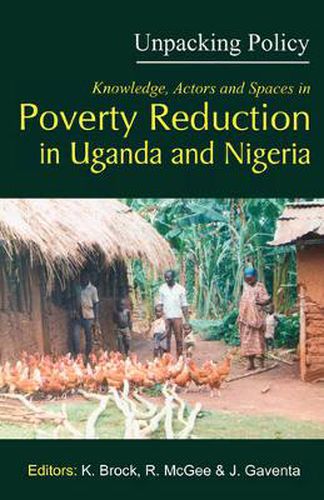Readings Newsletter
Become a Readings Member to make your shopping experience even easier.
Sign in or sign up for free!
You’re not far away from qualifying for FREE standard shipping within Australia
You’ve qualified for FREE standard shipping within Australia
The cart is loading…






This title is printed to order. This book may have been self-published. If so, we cannot guarantee the quality of the content. In the main most books will have gone through the editing process however some may not. We therefore suggest that you be aware of this before ordering this book. If in doubt check either the author or publisher’s details as we are unable to accept any returns unless they are faulty. Please contact us if you have any questions.
This book published for the Institute of Development Studies at the University of Sussex presents the findings of a team of researchers based in the UK, Uganda and Nigeria. It sets out to examine the processes by which policies for poverty reduction are made and implemented, and assesses to what extent policies provide for positive change in the lives of poor people. The project advocates a policy process that is radically different from the traditional linear model; one that departs from structural adjustment exigencies of external conditionality to one in which actors, knowledge and policy spaces interact in policy making. Strategies are generated and owned locally and the poor are understood as active participants in their own development. The book argues that if political systems and the policy processes through which they are enacted are to be democratised, then so should the knowledge base that feeds those policy processes.This means working by a deliberative process not only to produce knowledge, but also to incorporate knowledge of different kinds; differentiating between respective roles and powers of discourse, and reconstituting the prevailing cultures of legitimacy and representation. Although based on evidence from Uganda and Nigeria, the book is conceived to have application to the struggle against poverty more widely.
$9.00 standard shipping within Australia
FREE standard shipping within Australia for orders over $100.00
Express & International shipping calculated at checkout
This title is printed to order. This book may have been self-published. If so, we cannot guarantee the quality of the content. In the main most books will have gone through the editing process however some may not. We therefore suggest that you be aware of this before ordering this book. If in doubt check either the author or publisher’s details as we are unable to accept any returns unless they are faulty. Please contact us if you have any questions.
This book published for the Institute of Development Studies at the University of Sussex presents the findings of a team of researchers based in the UK, Uganda and Nigeria. It sets out to examine the processes by which policies for poverty reduction are made and implemented, and assesses to what extent policies provide for positive change in the lives of poor people. The project advocates a policy process that is radically different from the traditional linear model; one that departs from structural adjustment exigencies of external conditionality to one in which actors, knowledge and policy spaces interact in policy making. Strategies are generated and owned locally and the poor are understood as active participants in their own development. The book argues that if political systems and the policy processes through which they are enacted are to be democratised, then so should the knowledge base that feeds those policy processes.This means working by a deliberative process not only to produce knowledge, but also to incorporate knowledge of different kinds; differentiating between respective roles and powers of discourse, and reconstituting the prevailing cultures of legitimacy and representation. Although based on evidence from Uganda and Nigeria, the book is conceived to have application to the struggle against poverty more widely.